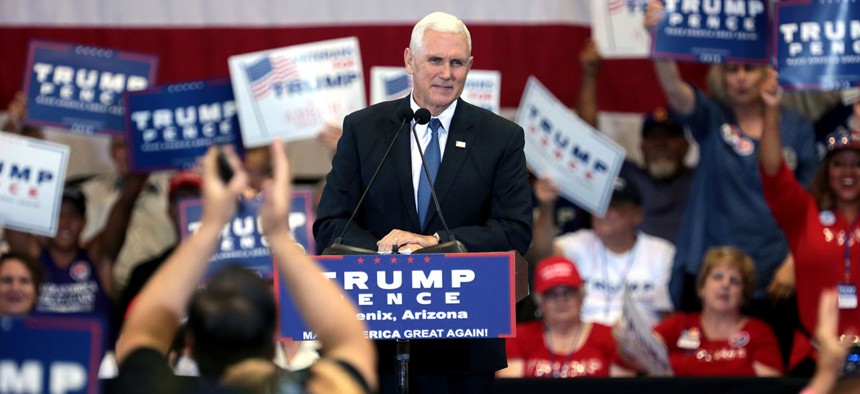
Flickr user Gage Skidmore
Mike Pence Wants to Create 'Safe Havens' Where Refugees Could be Vetted
Not even Christians or other religious minorities fleeing violence and ISIS would be exempt from the Trump campaign’s immigration ban.
On Monday, U.S. vice-presidential candidate Mike Pence gave an interview with Charlie Sykes, a conservative Wisconsin radio host. Pressed on the specifics of the Trump campaign’s proposed immigration ban on countries and territories that have been “compromised by terrorism”—and specifically what that would mean for persecuted Christians and Jews in those areas—Pence punted, choosing to restate the party line rather than answer the question directly.
On Wednesday evening, Marc Lotter, a spokesperson for Pence, confirmed in a telephone interview that Christians and Jews in these “compromised” areas would be banned from emigrating to the United States, at least temporarily. Instead, he said, they would be sent to “safe havens” while they could be vetted.
“There would be safe havens established to provide safety, security, and a safe location for people seeking to leave areas that have been overrun with violence and persecution,” Lotter said, “while the vetting process is taking place for immigration to the United States.” He did not specify where those proposed “safe havens” would be, referring questions about the specific location to the Trump campaign. “I think you would work with your international partners, as it relates to specific situations,” he said. He would not say whether there would be a specific process set up to speed the “vetting” of persecuted religious minorities seeking refuge in the United States.
As I wrote on Monday, this policy stance on persecuted Christians puts Mike Pence in a bind. It’s not viable—or, likely, legal—to propose that all immigrants from countries affected by violence take religious tests before entering the United States to determine whether they are Christian or Muslim or Jewish or adherents of some other religion. This was what some Republican presidential candidates advocated during the primary season, and that was Trump’s original proposal as well. For the general-election campaign, though, the campaign has pivoted: As Lotter said, Trump and Pence are now proposing temporary bans on entire countries or areas.
That creates a political problem, though: Many conservative voters, particularly those of faith, care a lot about protecting persecuted Christians. Especially for Mike Pence—the purported moral voice of the Trump campaign, the provider of conservative Christian bona fides, the self-styled defender of religious freedom—it seems politically dangerous to argue that the United States should turn away members of religious minority groups who have literally been crucified in the Middle East.
To that point: “I want to reiterate that Governor Pence has had a strong record in supporting Israel and supporting Christians facing persecution,” Lotter said.
That Trump and Pence would win widespread support for proposing a broad ban on Muslims, but face political trouble for proposing the same ban for Christians and Jews may be troubling, but it may not be the biggest problem with the campaign’s “safe havens” proposal.
The United States does not control the flow of refugees from areas where violence and war has forced people to migrate, said Westy Egmont, a clinical associate professor at Boston College who studies immigration and refugee resettlement. It can sometimes have a diplomatic role in negotiating the flow of peoples, or incentivize countries to take certain groups, but typically the countries that are geographically proximate to conflict areas make decisions about where people go. The United States would not typically play the kind of role in refugee management and resettlement that Pence and Trump are suggesting, and it’s unclear whether it could find the partners necessary to establish safe havens, or if they would attempt to carve them out by force of arms in active conflict zones.
Another problem with the country-based ban, said Egmont, is that it hits the persecuted along with their persecutors. “Does it work to identify countries and say that we should have a hard ban on people coming from those countries? No, obviously not, because those countries are where persecution is the worst,” he said. It’s also difficult to delineate which countries the ban would apply to; as Egmont pointed out, all countries, including the United States, have harbored or could potentially harbor terrorists. “It becomes a political definition rather than a legal practical definition,” he said.
In terms of immigration, Trump and Pence largely seem to allude to the threat of terrorism from the Middle East. But as The New York Times and other outlets havereported, people in countries like Syria and territories controlled by ISIS have faced intense persecution and violence. Many who work on refugee issues believe that the victims of ISIS aren’t the ones who should be excluded—they’re precisely the refugees who should be the focus of welcome. “We need to pay particular attention to how to provide a safe passage for individuals in those countries and provide a fairly expedited basis for those people seeking asylum or refuge into both our country and into other countries,” Egmont said.
This is not the first time the Trump campaign has talked about “safe havens” as a component of its immigration policy plan. The presidential nominee spoke about creating a special zone for refugees in Syria last November, and proposed that the Gulf States should pay for it during an interview in May. But as the campaign gets more specific about its policies—and, as Lotter promised, if it provides more detail about its proposals in the coming weeks—it will face increasing scrutiny of the complicated legal, operational, and political challenges to the American people.
(Image via Flickr user Gage Skidmore)
NEXT STORY: Play of the Day: Donald Trump is 'The Dress'






